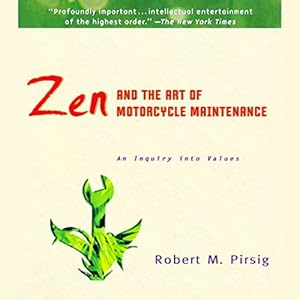Zen and the Art of Motorcycle Maintenance: An Inquiry Into Values
Author: Robert M. Pirsig
Zen and the Art of Motorcycle Maintenance had many times caused me to pull my car over and just think about philosophical concepts I couldn’t comprehend while operating a motor-vehicle. It successfully made me question science, quality and the importance of gumption.
Suggested Reading Ratings (tl;dr)
Of it’s category: 10/10 – Well written, intriguing, lots of content and very enjoyable.
Of all categories: 6/10 – It’s a great book, but has very specific topics and audience. I have a feeling not everyone share’s my enjoyment of philosophy, maybe 60% of you do, thus 6/10.
Re-readability: 1-2 years – I am certain I have missed a lot from this book, but it’s going take a while to continue to digest what I did learn. In due time I will be prepared to take the rest in.
 Why I Read It
Why I Read It
I read Zen and the Art of Motorcycle Maintenance because Josh Waitzkin recommended it at the end of his Audible book The Art of Learning. The Art of Learning was such a fantastic book with so many actionable takeaways I could not ignore Josh’s primary book recommendation. I had also heard of this book many times before, but nothing compelled me quite like Josh did.
I’m going to call Zen and the Art of Motorcycle Maintenance, ZAMM, from now on.
Summary
I would describe ZAMM as an inspiring philosophical journey. It’s a non-fictional story about the unnamed author and his son Chris, who are on a few week cross country motorcycle trip. They meet a handful of different people of the author’s past, all introducing breadcrumbs of the author’s lost memories. This story acts as a way of piecemealing the author’s philosophical past with his current mindset. It takes form in the author’s head, his thoughts and perceptions of this story and how he will use these to create a Chataqua, something I had not heard of before. I quite enjoyed the form of the book, switching between narrating the day with his son, to philosophical stream of consciousness and relating those back to motorcycle maintenance on the brief occasions when he needed a concrete example. It has mostly nothing to do with motorcycle maintenance.
Enjoyments

The philosophical topics discussed had me enthralled. They included: science, quality, universities / churches of reason and “gumption”. It really pulled me in when he convinced me in a short few minutes that science is equivalent to a ghost. It’s not real. It’s something we humans made up that some believe and some don’t. This was so obviously simple and yet not something I had thought about previously. I had taken maybe 5 philosophy courses in college, I loved them for extracurriculars, but science had not come up in them to this level.
ZAMM has a way of introducing a concept and convincing me of his points in what feels like a stream of consciousness, and not a proof or a lecture. It felt like I was along for the ride with him. Like for instance: If the scientific method is the accepted way to characterize natural science, how can you prove the scientific method is wrong? You can’t use the scientific method to prove it’s wrong, so you have to do something new, something different. It forces me to wonder how this meta idea relates to other things in my life? I very much fancy that wondrous thought process.
I particularly enjoyed and related to his thoughts on “Quality” and “Gumption”. I recently tried to define what is software quality and how you assure it with a friend of mine, Kathy. It was very difficult to define, and ZAMM nails why on the head, 10 times over. It’s both the end goal of something and the method, but neither individually. It’s not defined as functional, otherwise art would have no quality, but it’s not entirely individual bias either, as we can agree on specifics of quality of an item, but that doesn’t entirely define quality as a generic idea. Gumption is defined as the relationship between a person and quality. He goes into many traps that drain gumption. Example: A value trap is when you are stuck thinking something is true, when it may not be. You need to slow down, watch and observe all details again to discover the inaccuracy. Other traps are titled truth traps, muscle traps, ego trap, anxiety trap and boredom trap. All of these traps I could relate to immediately and all relate to Kathy’s and my presentation on how to assure quality. It was a great affirmation of the ideas we had and provided a deeper understanding to the results we were seeing.
Criticism
My only criticism of the book is, I often got lost. This is a problem with me and audio books in general, but it was amplified by the quick shifts in topic. Unfortunately this led me to being really confused by the ending. I have a feeling I missed a deep conclusion, it is the end after all. But regardless of that, I learned a lot and enjoyed it quite a bit. I perhaps will get the end on my second time around, which will probably be next year.
Suggestion
If you have interest in what quality truly is (or is not), theoretical ideas on what real reasoning and logic are and may enjoy them told through a first person story I promise you, you will learn a lot from ZAMM. Or if you just enjoy a good philosophical mind fuck, I highly highly recommend Zen and the Art of Motorcycle Maintenance.
Raw Notes
Check out my raw notes in their natural mind map form here: http://bit.ly/zammNotes

